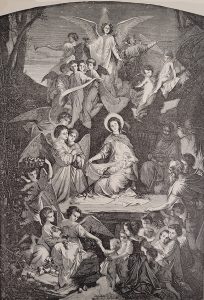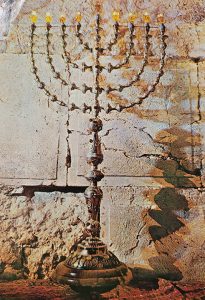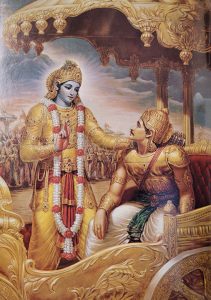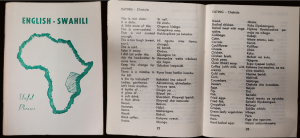The dark days of December are punctuated by the celebration of religious and cultural holidays, and festivals worldwide. At Seton Hall University there are a many ways to celebrate throughout this month. One of our most anticipated traditions is the annual Christmas tree lighting which takes place this year at 6pm on Monday, December 6th on the University Green. Christmas at The Hall includes concerts, charitable events, a cabaret and trips to Christmas markets. Check the calendar of events to see how you can participate.

New York: 1879, Benziger Brothers,
The image to the left depicts the birth of Christ, celebrated each at Christmas.
This time of year is when Hanukkah, also known as the Festival of Lights, is celebrated. The Jewish holiday commemorates the rededication of the temple in Jerusalem at the beginning of the Maccabean revolt against the Seleucid Empire the 2nd century BCE. This year Hanukkah is celebrated November 28th through December 6th. The hanukkiah, depicted to the right, is lit nightly to celebrate the eight nights of Hanukkah.

MSS0016, Box 1, Folder 34 – Sister Rose Thering Papers
The ninth candle is known as the shamash, or helper candle, since it is used to light the other eight candles. The laws of the holiday forbid using the light of the hanukkiah for practical purposes, reserving it to celebrate the miracle.
Geeta Jayanti, the birthday of Bhagavad Gita, the sacred text of the Hindus, is celebrated this year on December 14th. It is a major festival that commemorates the preaching of Gita to Arjuna, a young warrior, and Krishna, a god acting as Arjuna’s charioteer. The image above depicts Arjuna’s moment of doubt about his role in the impending battle against adversaries who are also his cousins.

Philadelphia: 1830, C. Sherman and Co. Printers
The festival is celebrated mainly in Kurukshetra, Haryana, India – a pilgrimage site believed to be the place where Krishna recited Bhagavad Gita to Arjuna. Sadhus (holy men), pilgrims from across the country, and many foreigners visit Kurukshetra for Gita Jayanti.
Kwanzaa, a seven-day celebration of African American culture is observed annually from December 26 through January 1. The name Kwanzaa is taken from the Swahili phrase “matunda ya kwanza,” meaning first fruits. Each evening during Kwanzaa, a candle is lit on the kinara, a traditional candleholder, to honor seven principles: Umoja (Unity), Kujichagulia (Self-determination), Ujima (Collective Work and Responsibility), Ujamaa (Cooperative economics), Nia (Purpose), Kuumba (Creativity) and Imani (Faith). The English-Swahili phrasebook below is open to a page with the translations for many foods that might be eaten during this time.

While this blog post is not exhaustive in scope, it is indicative of the diverse fabric of the community in which Seton Hall University resides as well as the rich heritage of our students, faculty and staff. The images above are but a small sampling of the variety of cultures, traditions and religions represented in the collections cared for by the Walsh Gallery and Special Collections at Seton Hall University. Students, faculty and researchers may make appointments to view materials. For access to this or other objects in our collections, complete a research request form to set up an appointment or contact us at 973-761-9476